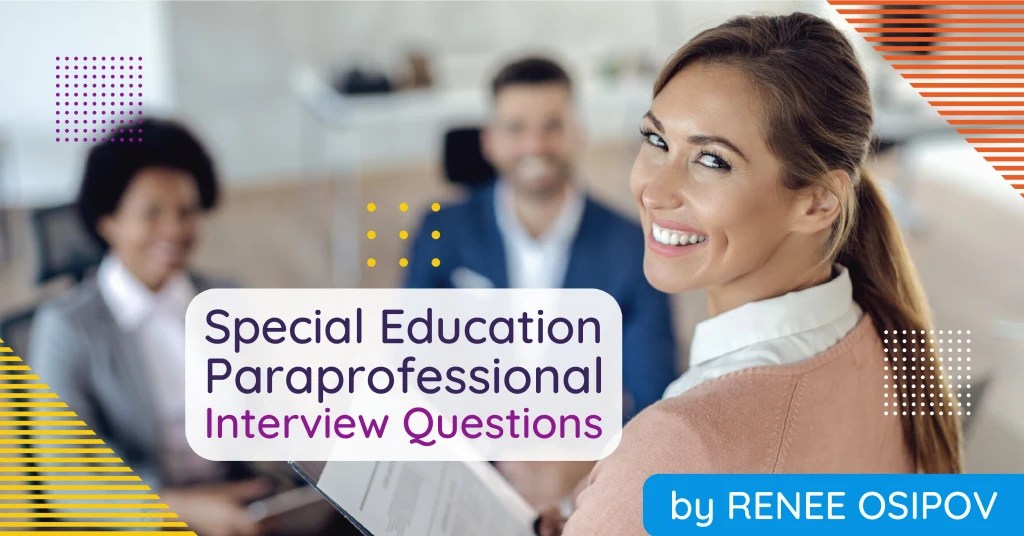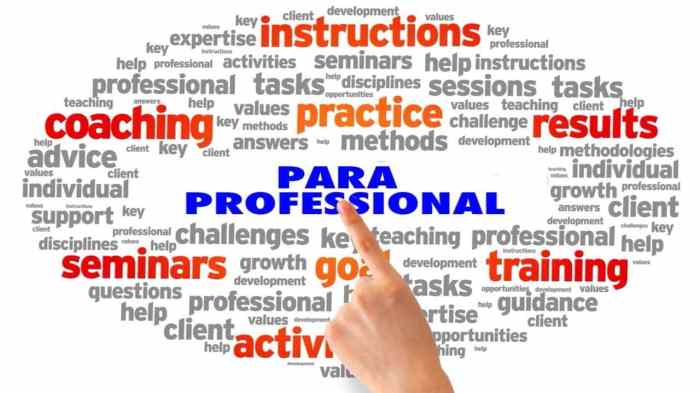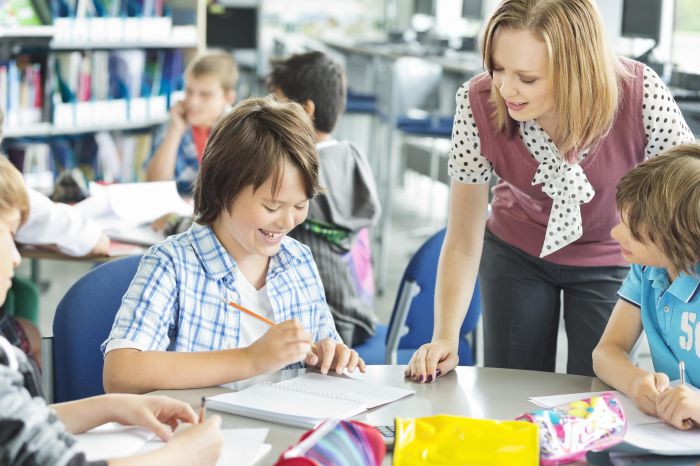Special education paraeducator interview questions provide a comprehensive overview of the essential knowledge and skills required for this crucial role. Understanding these questions can empower candidates to prepare effectively and demonstrate their qualifications to potential employers.
This guide explores the responsibilities, strategies, and ethical considerations involved in special education paraeducator roles, providing valuable insights into the interview process.
Special Education Paraeducator Interview Questions

Special education paraeducators play a vital role in supporting students with disabilities in the classroom. They work under the direction of a special education teacher to provide individualized instruction and assistance to students. During an interview for a special education paraeducator position, you may be asked questions about your experience working with students with disabilities, your knowledge of special education laws and regulations, and your ability to work effectively in a team environment.
Define the Role of a Special Education Paraeducator
A special education paraeducator is a paraprofessional who works under the supervision of a special education teacher to provide individualized instruction and support to students with disabilities. Paraeducators may work with students in a variety of settings, including general education classrooms, special education classrooms, and resource rooms.
Responsibilities and Duties of a Special Education Paraeducator
- Providing one-on-one instruction to students with disabilities
- Assisting students with completing assignments
- Monitoring student behavior
- Implementing behavior plans
- Working with parents and teachers to develop and implement IEPs
- Maintaining accurate records of student progress
Discuss Classroom Management Techniques
Effective classroom management is essential for creating a positive and supportive learning environment for all students, including students with disabilities. Paraeducators can play a key role in implementing classroom management strategies that are effective for students with disabilities.
Effective Strategies for Managing Student Behavior
- Establishing clear rules and expectations
- Providing positive reinforcement for appropriate behavior
- Using consistent consequences for inappropriate behavior
- Creating a structured and predictable environment
- Collaborating with the special education teacher to develop and implement behavior plans
Creating a Positive and Supportive Learning Environment
In addition to managing student behavior, paraeducators can also help to create a positive and supportive learning environment for students with disabilities. This can be done by:
- Building relationships with students
- Encouraging students to participate in class activities
- Providing students with opportunities to succeed
- Advocating for students’ needs
Addressing Challenging Behaviors
Some students with disabilities may exhibit challenging behaviors. Paraeducators can play a role in addressing these behaviors by:
- Understanding the underlying causes of the behavior
- Developing and implementing behavior plans
- Working with the special education teacher to provide appropriate interventions
- Collaborating with parents and other professionals to provide support
Describe Individualized Education Programs (IEPs)
An Individualized Education Program (IEP) is a legal document that Artikels the educational goals and services that a student with a disability is entitled to receive. Paraeducators play a key role in implementing IEPs by:
Purpose and Components of an IEP
The purpose of an IEP is to ensure that a student with a disability receives a free and appropriate public education (FAPE). An IEP must include the following components:
- The student’s present levels of performance (PLP)
- Annual goals
- Specific services that will be provided to the student
- A statement of how the student’s progress will be measured
Role of Paraeducators in Implementing IEPs
Paraeducators can play a key role in implementing IEPs by:
- Assisting students with completing their IEP goals
- Providing one-on-one instruction
- Monitoring student progress
- Collaborating with the special education teacher to develop and implement IEP goals
Examples of How Paraeducators Can Support Students with Disabilities
Here are some examples of how paraeducators can support students with disabilities in the classroom:
- Providing one-on-one instruction to students who need extra help
- Assisting students with completing assignments
- Monitoring student behavior
- Implementing behavior plans
- Working with parents and teachers to develop and implement IEPs
- Maintaining accurate records of student progress
Highlight Communication and Collaboration
Effective communication and collaboration are essential for paraeducators to be successful in their role. Paraeducators must be able to communicate effectively with students, parents, teachers, and other professionals.
Importance of Effective Communication
Effective communication is essential for paraeducators to be able to:
- Build relationships with students and parents
- Share information about students’ progress
- Collaborate with teachers and other professionals
- Resolve conflicts
Strategies for Building Strong Relationships
Paraeducators can build strong relationships with students and parents by:
- Getting to know students and their families
- Being respectful and understanding
- Communicating regularly
- Being available to answer questions
Explain How Paraeducators Can Facilitate Collaboration
Paraeducators can facilitate collaboration between the school and home by:
- Sharing information about students’ progress with parents
- Inviting parents to participate in IEP meetings
- Working with teachers to develop and implement home-school communication plans
Address Legal and Ethical Considerations, Special education paraeducator interview questions
Paraeducators are responsible for following all applicable laws and regulations. They must also adhere to the ethical standards of their profession.
Legal and Ethical Responsibilities of Special Education Paraeducators
Paraeducators have the following legal and ethical responsibilities:
- To protect the privacy of students
- To maintain confidentiality
- To treat all students with respect
- To follow all applicable laws and regulations
Examples of Situations Where Paraeducators May Encounter Ethical Dilemmas
Paraeducators may encounter ethical dilemmas in situations such as:
- When a student discloses information that is confidential
- When a student is being bullied
- When a student is engaging in self-injurious behavior
Explain How to Handle Ethical Issues and Maintain Confidentiality
Paraeducators should handle ethical issues by:
- Consulting with their supervisor
- Following the ethical standards of their profession
- Maintaining confidentiality
Share Best Practices and Professional Development
Paraeducators should stay up-to-date on best practices in special education. They should also participate in professional development opportunities to enhance their skills and knowledge.
Describe Best Practices for Special Education Paraeducators
Best practices for special education paraeducators include:
- Building relationships with students and parents
- Using effective communication skills
- Collaborating with teachers and other professionals
- Following all applicable laws and regulations
- Maintaining confidentiality
Discuss Opportunities for Professional Development and Growth
Paraeducators can participate in professional development opportunities such as:
- Attending workshops and conferences
- Taking online courses
- Reading professional journals
- Mentoring new paraeducators
Explain How Paraeducators Can Stay Up-to-Date on Current Trends and Research
Paraeducators can stay up-to-date on current trends and research by:
- Reading professional journals
- Attending workshops and conferences
- Participating in online discussion groups
- Collaborating with teachers and other professionals
Detailed FAQs: Special Education Paraeducator Interview Questions
What are the key responsibilities of a special education paraeducator?
Providing individualized support to students with disabilities, assisting teachers in implementing IEPs, and creating a positive and inclusive learning environment.
How can paraeducators effectively manage challenging behaviors in the classroom?
By employing positive behavior support strategies, collaborating with teachers and parents, and maintaining a calm and structured environment.
What is the role of paraeducators in implementing IEPs?
Supporting students with disabilities by providing individualized instruction, monitoring progress, and collaborating with the IEP team to ensure goals are met.

